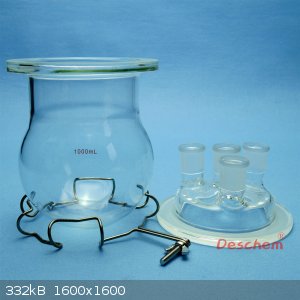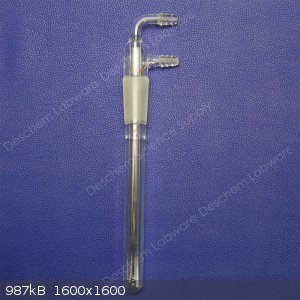querjek
Hazard to Self
 
Posts: 76
Registered: 26-8-2008
Member Is Offline
Mood: No Mood
|
|
Sublimation?
Hey all,
I lack a cold finger and would like to attempt sublimation to purify some benzoquinone. I imagine somehow I could use a buchner flask for this
purpose, but past that, I'm not too sure what to do; I know I need a surface for the quinone to condense onto, but am afraid that, by using the
buchner, the solid gas will simply become vacuumed away.
Any tips?
Thanks!
it's all about chemistry.
|
|
|
DJF90
International Hazard
    
Posts: 2266
Registered: 15-12-2007
Location: At the bench
Member Is Offline
Mood: No Mood
|
|
You can get a beaker, place the benzoquinone in it, and place a watch glass over the top. Heat, and the sublimate will collect on the watchglass (dont
forget the ice cube(s) on top!  ) )
|
|
|
The_Davster
A pnictogen
      
Posts: 2861
Registered: 18-11-2003
Member Is Offline
Mood: .
|
|
Can also improvise a cold finger by drilling out a rubber stopper to the outer diameter of a test tube. Then insert the tube into the stopper, and
this assembly into a buchner flask. The tube is then filled with ice.
You avoid it from being vacuumed out by using static vacuum, turn the vacuum on for a short time, then close a valve leaving vacuum in the flask,
without material being dynamically pumped out.
|
|
|
crazyboy
Hazard to Others
  
Posts: 436
Registered: 31-1-2008
Member Is Offline
Mood: Marginally insane
|
|
Place compound in a beaker, then place a round bottom flask on top fill it with ice and water then heat the beaker.
|
|
|
bfesser
Resident Wikipedian
    
Posts: 2114
Registered: 29-1-2008
Member Is Offline
Mood: No Mood
|
|
I've used all of the aforementioned techniques at one point or another--sometimes my purpose built sublimation apparatus just isn't ideal. They all
have their pros and cons. I have just one technique to add to the list--Petri dishes work wonders.
Get a glass Petri dish. They're suprisingly useful for chemistry--not just the gooier sciences! Just spread out the crude product in the bottom,
place the lid on top, and set it on a hot plate. (The bottom is the smaller dish, the top fits around and over it.) Place a glass beaker of water
ice slush on top, and heat gently. The short path seems to really help yields, there's plenty of surface for condensate to form on, and recovery is
easy as hell. The only downside is that it's only for atmospheric pressure sublimations.
The crystals are easier to scrape from a flat surface. It's nice to be able to just pour solvent in to dissolve the product, and pour it out again,
instead of having to hold/clamp and rinse off a round bottom, tube, etc. I also recommend removing the ice shlush beaker first, then allow the dish
to cool to room temp before recovering the purified product, otherwise you will get significant condensation of atmospheric water on your crystals.
|
|
|
querjek
Hazard to Self
 
Posts: 76
Registered: 26-8-2008
Member Is Offline
Mood: No Mood
|
|
Thanks for the suggestions guys--after getting benzoquinone vapors all over my face (they're really a lot more painful than I thought they would be),
I believe I've got the technique down. I had some issues with water condensing on the bottom of my RBF where the crystals were forming, but I think I
can account for that by using less ice.
it's all about chemistry.
|
|
|
DJF90
International Hazard
    
Posts: 2266
Registered: 15-12-2007
Location: At the bench
Member Is Offline
Mood: No Mood
|
|
Benzoquinone sublimes at a pretty high temperature so just using water in the RBF should be fine.
|
|
|
bfesser
Resident Wikipedian
    
Posts: 2114
Registered: 29-1-2008
Member Is Offline
Mood: No Mood
|
|
If you have it, try Parafilm over the 'joint' between the round bottom and the beaker. It can be trick to get it on, depending on the scale of the
glassware, but it should help to keep water out.
|
|
|
Refinery
Hazard to Others
  
Posts: 371
Registered: 17-2-2014
Member Is Offline
Mood: Still
|
|
How common and good method is sublimation for purification? I see it seldom used, but it appears interesting for many compounds that have high melting
point.
|
|
|
Abromination
Hazard to Others
  
Posts: 432
Registered: 10-7-2018
Location: Alaska
Member Is Offline
Mood: 1,4 tar
|
|
Its useful for products that readily sublime. If you research your product before hand, you should be able to determine whether or not it is viable.
In many cases, crystallization is much more convenient.
List of materials made by ScienceMadness.org users:
https://docs.google.com/spreadsheets/d/1nmJ8uq-h4IkXPxD5svnT...
--------------------------------
Elements Collected: H, Li, B, C, N, O, Mg, Al, Si, P, S, Fe, Ni, Cu, Zn, Ag, I, Au, Pb, Bi, Am
Last Acquired: B
Next: Na
-------------- |
|
|
Refinery
Hazard to Others
  
Posts: 371
Registered: 17-2-2014
Member Is Offline
Mood: Still
|
|
I see that it is highly case sensitive. I don't know how well it could perform when there are other substances that also evaporate, solidify or
sublime within few 10's of degrees.
I was thinking, could a reactor type flask be used for vacuum sublimations? Cold finger(s, as multiple joint flanges) could be inserted for
condensation.

[Edited on 13-7-2020 by Refinery]

|
|
|
Abromination
Hazard to Others
  
Posts: 432
Registered: 10-7-2018
Location: Alaska
Member Is Offline
Mood: 1,4 tar
|
|
I suppose you could, but why not just use a normal setup with a coldfinger under vacuum? Most borosilicate jointed glassware is already rated for
vacuum. Pull a vacuum under a 2 necked rbf with a coldfinger, vacuum adaptor and a trap.
List of materials made by ScienceMadness.org users:
https://docs.google.com/spreadsheets/d/1nmJ8uq-h4IkXPxD5svnT...
--------------------------------
Elements Collected: H, Li, B, C, N, O, Mg, Al, Si, P, S, Fe, Ni, Cu, Zn, Ag, I, Au, Pb, Bi, Am
Last Acquired: B
Next: Na
-------------- |
|
|
njl
National Hazard
   
Posts: 609
Registered: 26-11-2019
Location: under the sycamore tree
Member Is Offline
Mood: ambivalent
|
|
Does anyone have any info for large scale sublimation? Specifically for the preparation of phthalic anhydride (100+grams). I have tried the usual
beaker + RBF method but it is very tedious.
|
|
|
draculic acid69
International Hazard
    
Posts: 1371
Registered: 2-8-2018
Member Is Offline
|
|
I also had the cold water condense on the the problem.never could solve it
|
|
|
Dr.Bob
International Hazard
    
Posts: 2734
Registered: 26-1-2011
Location: USA - NC
Member Is Offline
Mood: No Mood
|
|
I have a few real sublimation apparatti available. Need to take some photos sometime, but if anyone is really serious about doing this, you can get
a setup for a reasonable price. I think I have a small one, maybe a medium one, if not sold yet, and somewhere I have a large one.
BTW, compounds with more symmetry tend to sublime better, there is a good physical chemistry reason for that, which I forget now, but I am sure that
Google can find it. I have previously sublimed ferrocene, which is pretty amazing, given it contains an iron atom. Many other solids do well.
|
|
|
Sulaiman
International Hazard
    
Posts: 3696
Registered: 8-2-2015
Location: 3rd rock from the sun
Member Is Offline
|
|
I've only sublimed iodine,
Ice water in an rbf over a heated beaker caused atmospheric water to wet the iodine.
An rbf of room temperature water worked well.
I hope to try a glass petri dish sometime as it sounds like a good method.
CAUTION : Hobby Chemist, not Professional or even Amateur
|
|
|
Refinery
Hazard to Others
  
Posts: 371
Registered: 17-2-2014
Member Is Offline
Mood: Still
|
|
This is a beginner question, but what are the general requirements for sublimation purification? I have understood that most anything can be sublimed
if they have high enough melting point and low enough boiling point.
|
|
|
njl
National Hazard
   
Posts: 609
Registered: 26-11-2019
Location: under the sycamore tree
Member Is Offline
Mood: ambivalent
|
|
Depending on what you're sublimating the atmosphere in your vessel might have to be non-oxidizing. If you mean the literal requirements for
sublimation I think boiling/melting point are the biggest factors, but practically there might be issues with decomposition and the structure that the
compound takes on when it solidifies. Phthalic acid for example forms long, fluffy crystals that tend to fall back into the subliming acid if you're
not careful.
|
|
|
Bubbles
Harmless

Posts: 31
Registered: 13-7-2020
Member Is Offline
|
|
When accidentally overheating anthranillic acid in my oven recently, it was noted that it sublimed and formed nice, pure-looking crystals on my oven
door.
|
|
|